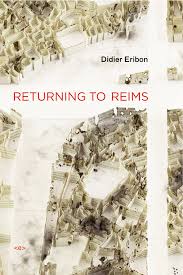 Eribon, Didier. Returning to Reims. Translated by Michael Lucey. Semiotext(e). 2013. $17.95. 240p. PB. 978-1-58435-123-8.
Eribon, Didier. Returning to Reims. Translated by Michael Lucey. Semiotext(e). 2013. $17.95. 240p. PB. 978-1-58435-123-8.
Originally published in French in 2009 to great acclaim, this compelling and erudite memoir by sociologist Didier Eribon has now been released in an accessible English translation. Returning to Reims recounts Eribon’s coming of age in Reims and Paris in the 1960s and 70s, reminiscences spurred by the death of his estranged father and his return to his family home. For Eribon, however, a noted critical theorist and professor of sociology best known for his groundbreaking 1989 biography of Michel Foucault, this personal history acts as evidence of a central social theory.
Eribon proposes that his keen sense of alienation as a young man stems more from his working-class background than his homosexuality. In fact, his sexuality provides him the pretext to create a new self as a Parisian intellectual; he argues that homosexuality “can serve as a way of building a world, of constructing an ethos that is different from the one he inherits from his social circumstances.” In previous works, especially Insult and the Making of the Gay Self, Eribon examined the effects of the sexual closet; in Returning to Reims, he chastises himself for not recognizing earlier the damaging stigma of his socioeconomic background, termed the “class closet.”
The trajectory of Eribon’s story alleges an inability or unwillingness to move between the seemingly incompatible registers of the worker and the intelligentsia. This inability culminates in the total denial of his impecunious family, place of origin, and habitus as relayed in a passage detailing his adolescent anxiety at the prospect of encountering his window-washer grandfather on the streets of Paris while with his college friends. Yet Eribon demonstrates this very ability by masterfully juggling the registers of philosophical and sociological discourse with a straightforward and empathetic, yet almost Spartan, account of the conditions of his native milieu. Eribon ultimately attributes this ability to move between classes to his sexual identity. “What characterizes queer lives or gay lives,” he concludes, is “the capability — or the necessity — of moving regularly back and forth between spaces and between temporalities (from normal to abnormal and back again).”
Eribon deftly weaves the events of his life and family history with an incisive analysis of such topics as the construction of class identity, the “garden city” housing developments of early twentieth-century reformers, the ruinous effects of the World War II on social mobility for young women, the track system in French education, the shifting political allegiances of workers, the fleeting nature of youthful attachments, and the acquisition of social capital. Writers ranging from James Baldwin and John Edgar Wideman to Jean-Paul Sartre and Pierre Bordieu, Annie Ernaux to Eve Kosofsky Sedgwick feature prominently in Eribon’s analysis, their ideas and experiences intertwined insightfully to each other and Eribon’s own thoughts.
In reading Returning to Reims, I underlined so many resonant passages as to render my notations practically meaningless. Introduced by George Chauncey (best known for Gay New York: Gender, Urban Culture, and the Making of the Gay Male World, 1890-1940), this work offers wide-ranging insight into French thought, politics, society, education, and gay culture of the twentieth century. Translator Michael Lucey’s notes further assist with allusions and references that English-language readers might otherwise miss.
Overall, Returning to Reims is well-produced, of high quality materials and construction, and comfortably readable. It is highly recommended for academic libraries, as well as for public and other libraries interested in memoir, French culture, LGBT works, or philosophy.
Reviewer: Anna-Sophia Zingarelli-Sweet
MLIS Candidate, Archives and Information Science
University of Pittsburgh

[…] Didier. Returning to Reims. August […]